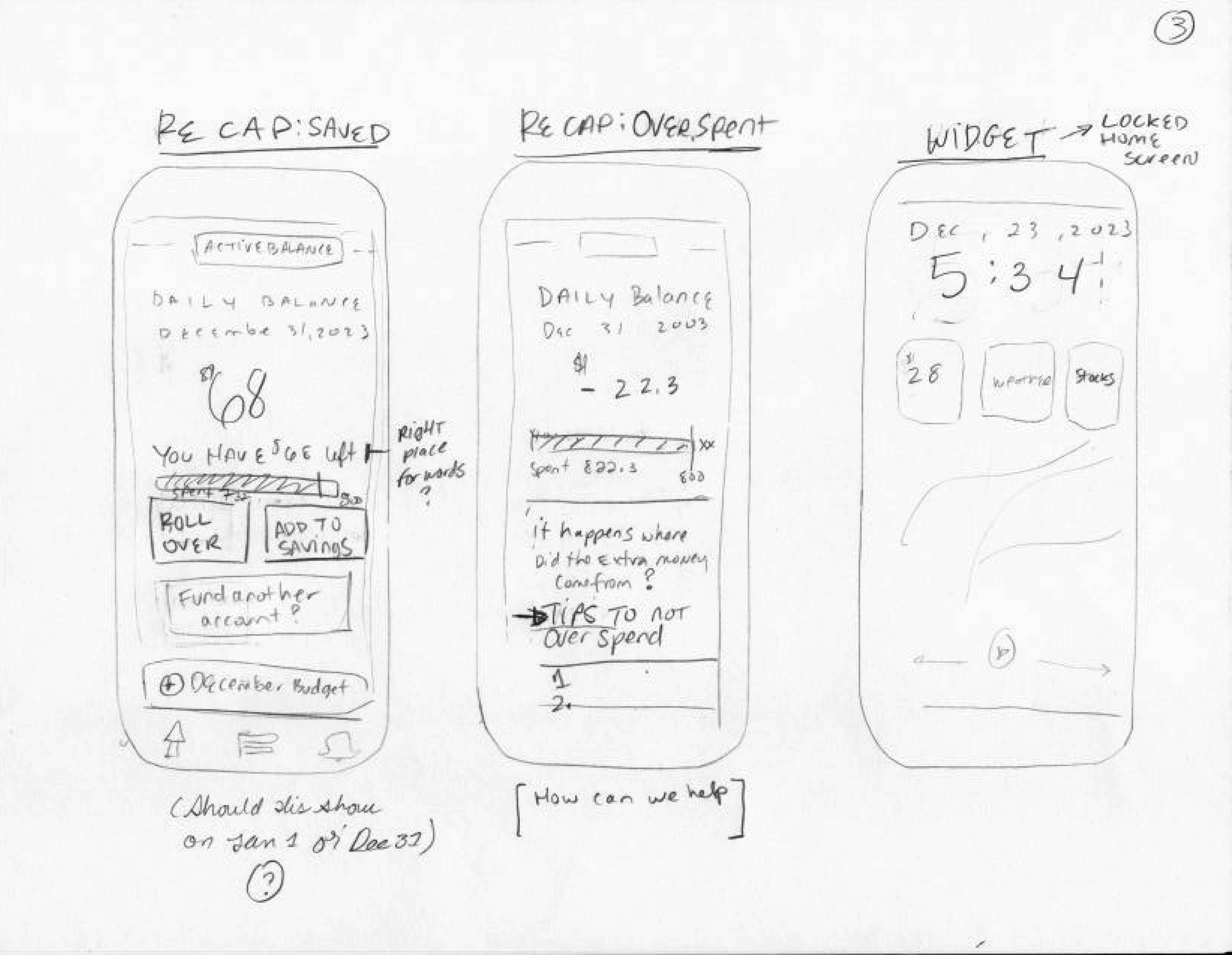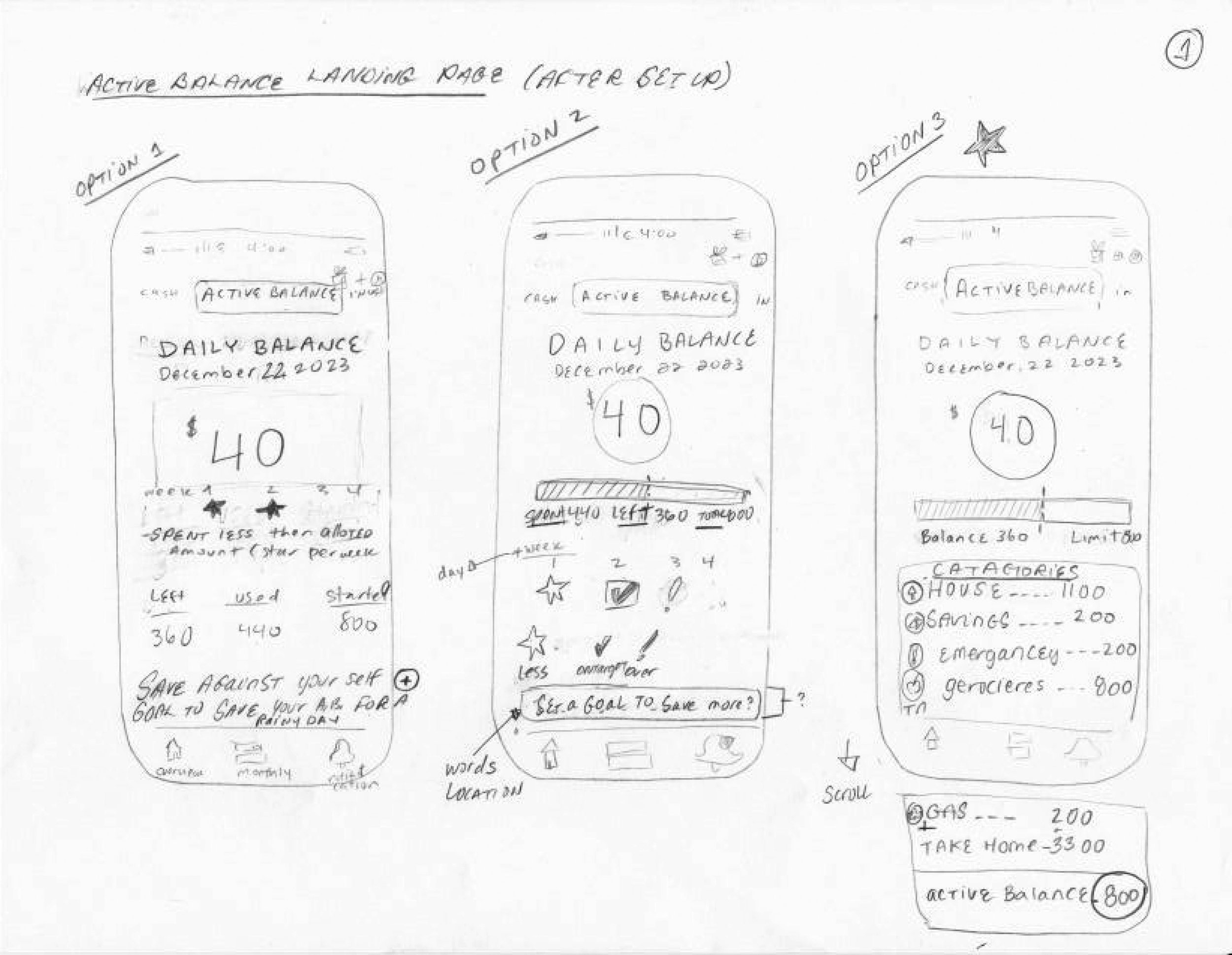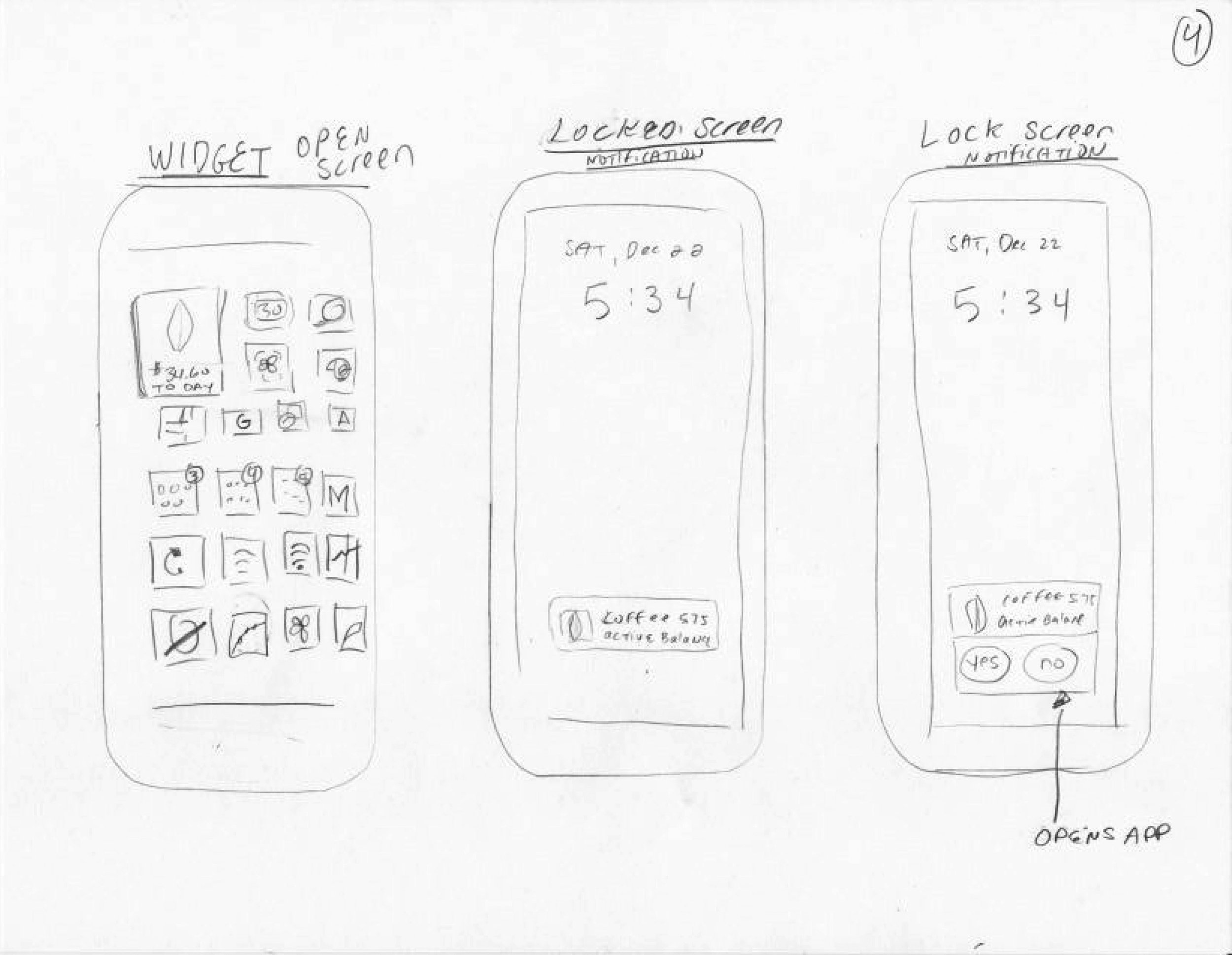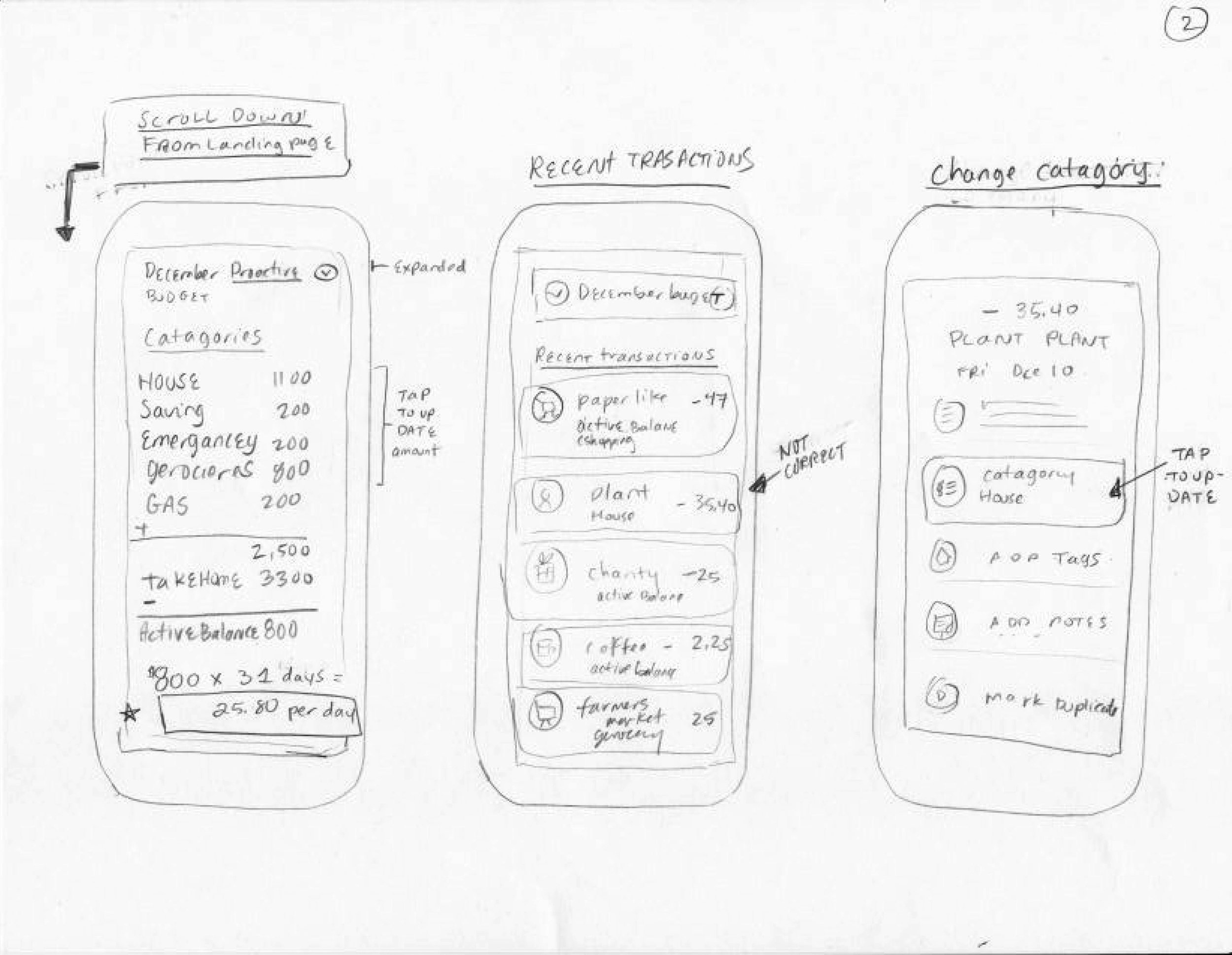Active Balance
Simplifying your daily balance
Product Type
Adding a Feature to the Mint Mobile App
3 weeks / 100+ hours
Concept Client
Mint Intuit
My Role
User Experience Design, User Research, Prototyping, User Testing
Tools
Figma, Illustrator, Otter.ai, Photoshop, Google Meet, Mural
Problem
Active Balance aims to create an addon feature for integrating financial management into the daily lives of Mint users, promoting financial health and peace of mind.
Despite the wide array of budgeting tools, many find them complex and time-consuming. The Active Balance feature is set to identify and alleviate user pain points for easier budget management by tackling prevalent issues.
Data surveys from NerdWallet and Mint show that a majority of Americans regularly exceed their budgets and lack awareness of their expenditures. My proposal involves integrating a feature into an existing platform that resonates with user habits and secures their long-term engagement. This approach aims to attract new users, re-engage existing ones, and strengthen trust by demonstrating the company's commitment to user-centric innovation.
Goal
Investigate users' budgeting challenges
Interview users to tailor a solution to their needs
Create an empowering and positive budgeting experience for users
Solution
The need for simplicity in budgeting was evident from my research. I developed a streamlined method that enables users to thoughtfully control discretionary spending after accounting for essentials, such as bills and savings. The system assists users in determining reasonable personal spending for activities like hobbies or casual outings. Iterative testing and refinement were conducted to ensure the tool was user-friendly and effective.
Competitive Analysis
Understanding the ways individuals are able to budget with the current tools will show me the playing field of features that users currently have access to.
My competitive analysis identified Mint as a leading budgeting app with its extensive account management, retirement planning, and tax solutions. However, Mint has the potential to improve user engagement and market share by embracing various budgeting techniques for different user preferences.
Through the competitive analysis of budgeting apps, it's clear that trade-offs exist between ease of use, range of features, and cost. Free apps may offer basic services and suffer from ad-related trust issues, while paid apps provide comprehensive budgeting tools at a higher price and sometimes miss the feature of investment tracking. Generally, a gap remains for an all-encompassing, user-friendly, and affordable budgeting app that can satisfy the full spectrum of consumer financial needs.
Competitor Insights
Optimize Mint's integrations for diverse budgeting learning styles
Focus on retaining and re-engaging users, addressing dissatisfaction with existing budgeting tools
Expand on intuitive budgeting methods to stand out
User Interviews
Interviewees seek a hassle-free financial tool that is efficient, user-friendly, and maps to their thinking.
Through interviews, I hope to understand how:
users encounter saving habits and challenges in managing finances
users approach financial management
users engage with financial tools and apps
“Budgeting seems like it's so laborious and something that I don't like. It's like one more thing I have to manage. So I think I just take the approach of like, I just will be really cheap all the time”.
– Interviewee
75% of interviewees practice frugality for budgeting but freely spend on significant items.
30 percent of the individuals surveyed allocate funds automatically or manually each month.
All the participants wanted to better understand their budgets and be able to talk about money more freely.
User Interview Insights
Despite the various tools available, many users find them confusing and time-consuming
A need for an intuitive, user-friendly tool built around conscious, discretionary spending
No clear way to set daily amounts connected to real time balance, what can be spent and has been spent
Affinity Mapping
Users want an easy financial education tool to reduce stress and create positive money management experiences that works with their mental models.
Some users try to balance frugality and indulgence in spending habits, prioritizing their desires while trying to maintain a sense of financial responsibility.
Some users utilize automatic withdrawals as a convenient method for managing finances.
Survey results highlight a strong interest in enhancing financial literacy, with all participants expressing a desire for improved understanding and easier access to financial information and tools.
Key Affinity Map Insights
Both survey responses and interview insights reveal that when people are budgeting, they often utilize automatic withdrawals to manage finances, which is integral in understanding discretionary funds.
Budgeting apps can be stressful. Users would like a user-friendly, stress-free budgeting platform that offers flexibility in setup and notifications, while highlighting the need for improvements in financial education.
Intermittent reliance on Mint highlights the need for improvements encouraging
sustained user engagement.Users desire an open space to discuss financial literacy.
User Perspective
Users grow frustrated with budget apps—those that promise ease and results, yet often become a burden. Considering the problem from the user’s perspective provides vital insight to how we can solve their needs.
Through Point of View Statements (POV) and How Might We (HMW) questions I look to identify which features best assist users seeking to re-engage with methods aligned to their mental models, as well as offer new budgeters an approach that is intuitive, easy to use, and not intimidating.
Highlighted POV
Avery needs a way to easily categorize what is left of her income after paying for housing, bills, and setting aside emergency funds. This is because she is used to relying on automated methods to help save money. Expanding on established habits may help improve her financial management.
↓
Highlighted HMW
How might we set up a system that allows Avery to interact with the goal setting budget app but not have it be to time consuming?
POV and HMW Insights
POV: From the users’ perspective, I grasped the frustration stemming from budget apps that over promise and under deliver, turning promising financial tools into burdens.
HMW: My empathy with users underscores the need for a budget feature that simplifies setup, removes the typically annoying time investment, and fosters the gradual formation of healthy financial habits
Personas
Crafting personas helped to highlight the diversity of needs, potential daily touch points and common threads that will help inform how to best solve the add-a-feature problem.
This process is more than user profiles; it is about staying connected with users while developing solutions. User insight clears a direct path toward building an app that is intuitive, personal, and adaptable.
Avery Davis
Age: 42
Education: PhD
Status: Partnered
Occupation: Bookstore Manager
Tech Literate: High
About User
Avery, based in Seattle, is an avid learner with a passion for staying current on the latest tools and technologies. Quick to grasp new concepts, she tends to move on to new interests if she gets bored or forgets about a particular technology.
Core Needs and Goals
Effective general budgeting including future events and emergencies
Finding time for events and small group outings
Making time for hobbies
Frustrations
Can spend too much on eating out and activities with friends
Finds conventional budgeting tools intimidating
The task of constantly updating the app is time-consuming
“Fantasy doesn't pay bills”
Ethan Crane
Age: 35
Education: Masters
Status: Single
Occupation: Social worker
Tech Literate: Medium
About User
Ethan, a social worker in Indianapolis, excels in his role but struggles with new technology, often leading to frustration and a quick tendency to give up.
Core Needs and Goals
Understanding how to budget income
Keeping up with housing expenses
Traveling
Frustrations
Collects a lot of information but does not know what to do with it
Wants to increase income to and save more
“I don't have a solid system for budgeting. And that's such a intimidating word.”
Persona Insights
Personas involve direct integration into the development of the app's design. Insights from interviews, competitive analysis, affinity mapping, and thoughtful consideration of the information gathered shape my approach to design. It ensures that features resonate between research and intended audience, positioning me to design an experience that is intuitive, adaptable and ready for iteration.
Information Architecture
User and task flows for Active Balance clarified process of thought, helped to prioritize pages, maximize flow, and prevent bloat allowing focus on the feature and user experience.
A well-constructed site map is key to a collaborative dialogue throughout development. It aids understanding by encouraging focus and control over the fluid, often turbulent ideation process.
User Flow for opting in to Active Balance
Notifications task flow
Interaction Insights
The site map guided the creation of a comprehensive layout for effective user testing and feature integration.
It was important for planning the user interface, ensuring a thorough preparation for user testing.
It facilitated the incorporation of new features into the app, clarifying overlaps and guiding customization options.
User Interface Design
Sketching interfaces through low-fidelity (lo-fi) prototypes honed user experience with direct feedback and design iteration.
This case study pursued insights into user behavior by examining reactions to homepage layouts, observing interactions to category screens, testing users' problem-solving with incorrectly categorized items, and refined the active balance feature of Mint with a series of wireframes and lo-fi sketches.




Learning and improvement insights
Users readily grasped the concept of daily spending tracking.
Widget received positive responses.
Feedback indicated the need for additional research on how users understand the graphs.
Participants suggested introducing diverse motivational techniques to maintain engagement (version 2 idea).
HI-Fi Mock ups
Progress toward higher fidelity mock ups revealed that users were excited about the daily budget feature, but clarity eluded its initial presentation.
A quick and easy way to visualize discretionary funds ensured that users became familiar with the process after just one use. These ongoing refinements have contributed to positive outcomes.
Keep discovering
Informed iterations enabled the creation of an added feature that took the power of Mint and developed another mental model for budgeting with a broad user base.
Iterating with user feedback
Although aspects of the app were user-friendly, clarity on the daily budget concept was lacking. My goal was to refine the functionality and affordance of the new feature that would retain functionality and allow the app to fit into the existing eco system while widening the user base.
A cycle of design, testing, and tweaking was embraced. Each round of changes was a conversation with users, a chance to dial-in on details and enhance the app’s usability. The first round of iteration kept the user in mind while working with personas and my task flows. However, familiarity from the developers perspective revealed the need for excessive explanation to gain insight from users. Due to the anxiety potentially surrounding the topic, it was found that simplified navigation within a budgeting and financial management tool was the most effective.
Daily View
Introduced a top title featuring
- The title of the new feature
- Information icon to learn more about the feature
- Added the date in a clearer wayAdded an easy way to tab through different views of the app
Made the daily budget more prominent
Clarified what you have spent
Added a visual remaining balance and tomorrow’s balance based on current balance
Added messaging
Showing how the average is created
Added a quick budget view
Monthly view
Introduced a top title featuring
– The title of the new feature
– Information icon to learn more about the feature
– Added the date in a clearer wayAdded an easy way to tab through different views of the app
Made monthly budget more prominent
Clarified what you have left
Added an update budget button
Screen 1
Screen 2
Screen 3
New Screens after 2nd round of testing.
Screen 1: Added information so the user can tap and be reminded how the feature works
Screen 2: Added weekly view
Screen 3: Added information so the user can tap and be reminded how the feature works
Iteration of the fittest
User testing showed the app's need for improved intuitiveness. Recognizing that users found budgeting intimidating or overwhelming led to developing a concept centered around allocating a daily budget tailored to each individual's spending habits. Initial feedback was positive, but further testing revealed the need for research on user preferences regarding data visualization, such as preferred graph types and timeframes. Iterations addressed this feedback, aiming to enhance both understanding and usability. Experiments with various visual elements including bars and circles were conducted during the process of refining the low-fi markups. However, users consistently struggled to interpret the meaning of horizontal bars as visualizers which led to the element’s omission.
Reflections
I successfully created a new feature for the Mint Intuit app—transforming Active Balance into a user-friendly platform and allowing users to seamlessly engage without encountering significant hurdles.
However, recognizing the inherent complexity of budgeting, I remain intrigued by the prospect of gradually advancing the system as users become more accustomed to its features. Continuous iteration was essential to making this mind exercise a challenging but fun and rewarding journey.
Looking ahead, I am eager to further explore avenues for improvement. Specifically, I aspire to delve into how users integrate Active Balance into their daily routines and to identify opportunities for refining the system even further. Budget on!















